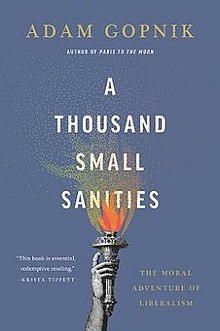A Thousand Small Sanities
This article contains wording that promotes the subject in a subjective manner without imparting real information. (February 2021) |
 First edition | |
| Author | Adam Gopnik |
|---|---|
| Language | English |
| Subject | Political science, Liberalism |
| Genre | Non-fiction |
| Set in | Politics of 2019 |
| Publisher | Basic Books |
Publication date | May 14, 2019 |
| Publication place | United States |
| Media type | Print, CD, E-book |
| Pages | 249 or 272 |
| ISBN | 9781541699359 |
| OCLC | 1051137376 |
A Thousand Small Sanities: The Moral Adventure of Liberalism is a non-fiction book about liberalism by Adam Gopnik.[1] published by Basic Books on May 14, 2019.
Summary
The main theme of the book is that liberalism and liberals are under attack, not just from the right, but also from the left.[citation needed] It argues that liberalism is historically, and presently, more than "political centrism or the idea of free markets" and thus is an overarching concern for "positive, inclusive changes at all social and political levels."[2]
The book explores concepts surrounding liberalism, humanism, and conservatism.[3] After covering the roots of liberalism and conservatism, the book discusses historical people that are deemed liberal in the present, but who were not deemed liberals in their own time. Gopnik avoids emphasizing connections to 17th and 18th century philosophers as well as the Founding Fathers, but instead covers figures such as Harriet Taylor, Frederick Douglass, Emma Goldman, Bayard Rustin, George Eliot, and E. D. Morel, among others.[4]
Pragmatism
Gopnik also argues for incremental, inclusive liberalism, and that engaging in the extremes of the far-left will attempt "to define liberty for everyone"— an attitude that he argues has historically resulted in the formation of totalitarian regimes.[4][5] The book attempts to steer Democrats away from 2020-era progressive policies and towards a liberalism that is "sensible, skeptical, cautious, reformist, and moderate— a path to political safety" between the extremes of the left and the right.[6] Through this, Gopnik argues that he has clarified the definition of "liberalism".[6]
Reception
David Sessions, a doctoral student in modern European history at Boston College and a fellow at the Clough Center for the Study of Constitutional Democracy,[7] criticizes the book heavily in The New Republic. In his review, he states that A Thousand Small Sanities "lacks a fundamental understanding of political-economic power...A Thousand Small Sanities is not about politics but about feelings toward politics."[8] He says that The New Republic didn't expect much from Gopnik, but that A Thousand Small Sanities only presented them with running clichés and a refusal to look at reality, and that showed them just how little the American establishment had learned since the turn of the century.[8]
References
- ^ "Buy A Thousand Small Sanities: The Moral Adventure of Liberalism Book Online at Low Prices in India | A Thousand Small Sanities: The Moral Adventure of Liberalism Reviews & Ratings - Amazon.in". www.amazon.in. Retrieved 2024-02-06.
- ^ Iglesias, Gabino (May 15, 2019). "...A Lesson In Understanding Liberalism". National Public Radio. Retrieved August 28, 2019.
- ^ Humanist, The (2019-07-02). "A Thousand Small Sanities: The Moral Adventure of Liberalism". TheHumanist.com. Retrieved 2024-10-29.
- ^ a b Frum, David (May 14, 2019). "In Defense of Liberalism". The New York Times. Retrieved August 28, 2019.
- ^ Sessions, David (May 6, 2019). "The Emptiness of Adam Gopnik's Liberalism". The New Republic. Retrieved August 28, 2019.
- ^ a b Bell, David A. (June 12, 2019). "Lost Bearings: Adam Gopnik and the search for a 21st-century liberalism". The Nation. Retrieved August 28, 2019.
- ^ "The Emptiness of Adam Gopnik's Liberalism". The New Republic. ISSN 0028-6583. Retrieved 2024-10-23.
- ^ a b "The Emptiness of Adam Gopnik's Liberalism". The New Republic. ISSN 0028-6583. Retrieved 2024-10-12.
External links
- A Thousand Small Sanities. Publisher's website. August 2019.
